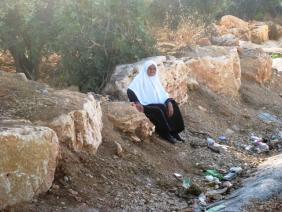Qalandiya, Sun 19.9.10, Afternoon

"Now therefore ye are cursed, and there shall none of you be freed from being bondmen, and hewers of wood and drawers of water for the house of my God" (Joshua 9:23)
El Jib checkpoint- the biblical Givon:
The villagers from El Jib had been farmers for hundreds of years until the State of Israel had confiscated most of their lands. Out of 9,000 dunams of agricultural and fertile land, they now hold only 1,900 dunams.
Many have become unemployed and find it hard to make ends meet as they make their livings off occasional jobs. Those who were lucky and were found to present no threat had found a new career: building settlement houses at "New Givon" and "Givat Ze'ev", they pave settlement roads and erect the fences of the separation wall.
At the break of dawn thousands of people pass and reach the land that was once their own, in order to build and pave for the intruders who live on the other side of the fence.
This reality had revived Joshua's curse on the residents of Givon.
We headed to the checkpoint on Palestinian roads. The inner roads were full of potholes and they lacked rims. We passed Kufer-Akeb, Smirmis and Om-Shureit, and we kept going on what is known as the "Fabric of Life Road" which goes beneath the 443 bridge, designed precisely so that those above won't see the invisible people driving below.
We passed through Bir Nabala. Ever since this town had become an enclave the streets are deserted. There were no other vehicles, a part for our own, on the main road that crosses the town. The stores on both sides of the road are always closed and there was filth and neglect everywhere.
In front of the checkpoint we met a group of cab drivers and their vehicles, waiting for the people who were returning from work.
They told us that the passage is permitted only to those who appear on the list the soldiers have, the list includes the names of the people working in the settlements. Apart for those workers the list also includes some Palestinian families who live on the other side of the fence.
We asked whether the soldiers would allow us to pass and all of them replayed that they wouldn't: it's only according to the lists!"
One cab driver revealed before Nurit his world-view:" In our culture when a married couple has kids, if the husband dies and the wife re-marries, the children will call him uncle and not father. He has to take care of all their needs. Israel occupied the Palestinians, it's her duty to look after them and not to humiliate.
A twenty year old person who lives in the village Ktana was on his way to Nabi Samuel. He told us that one of his family members had passed away and that the family had permits from the DCO. He didn't pass the checkpoint. He was sent back in sham: "I am suddenly refused passage..."
A middle aged person, who was also refused passage, had his permit taken away from him (it was actually a work permit= a permit to make a living= a permit for a decent life) one morning four months ago and ever since it hadn't been returned to him: "They told me I was prevented passage by the GSS". He managed to reach the captain just to ask "why", the replay he got was: "You tell me..."
The soldier (as the cab drivers promised us) wouldn't allow us to pass the checkpoint. "I'm on my way to my country", I said to him- "It's my country as well but I don't fight against it..." he answered, refusing to open the gate for us. Before we had the chance to turn around and head back, a BP soldier who was hidden in his post (and who the whole time we were there informed someone over the phone of our actions: "they are taking photos... they want information... they...they...", ) hurried to open the gate for us while explaining to the amazed soldier: "It's a onetime thing! We don't want to take any risks".
Qalandiya checkpoint:
In spite of (or because) the fact that there were few people passing through the checkpoint, the soldiers amused themselves by giving those waiting a run around and forced them to go back and forth between the lanes. After a short wait, when we arrived at the turnstiles leading to the inspection post, they were locked shut before us. We hurried to the lane next to ours: "only green ID through here", told us those who were waiting in line. The lane beside it, the one that we had already been in, had reopened and we had to join the end of that line and wait again.
A part from the soldiers from the passage unit who were inspecting those entering Jerusalem at the vehicle checkpoint, were civil security men with drawn rifles and some policemen who stopped drives and gave tickets to passengers who weren't buckled: "The child was born ten days ago?- Would you like her to die before having lived a month because of the seat belt?", we heard a cop preach to a young mother.
A person on a motorbike tried in vain to protest against a fine for 100 Shekels that had been given him. He said the security man told the policeman that he had been driving without lights. After the argument he aroused by trying to convince the policeman he was right had subsided, he came to us: "I had my light on. I swear I had my light on. He (the security man) lied when he said I didn't. I've been working all day. From six AM up to now. I earned a hundred Shekels- now it's all gone.
